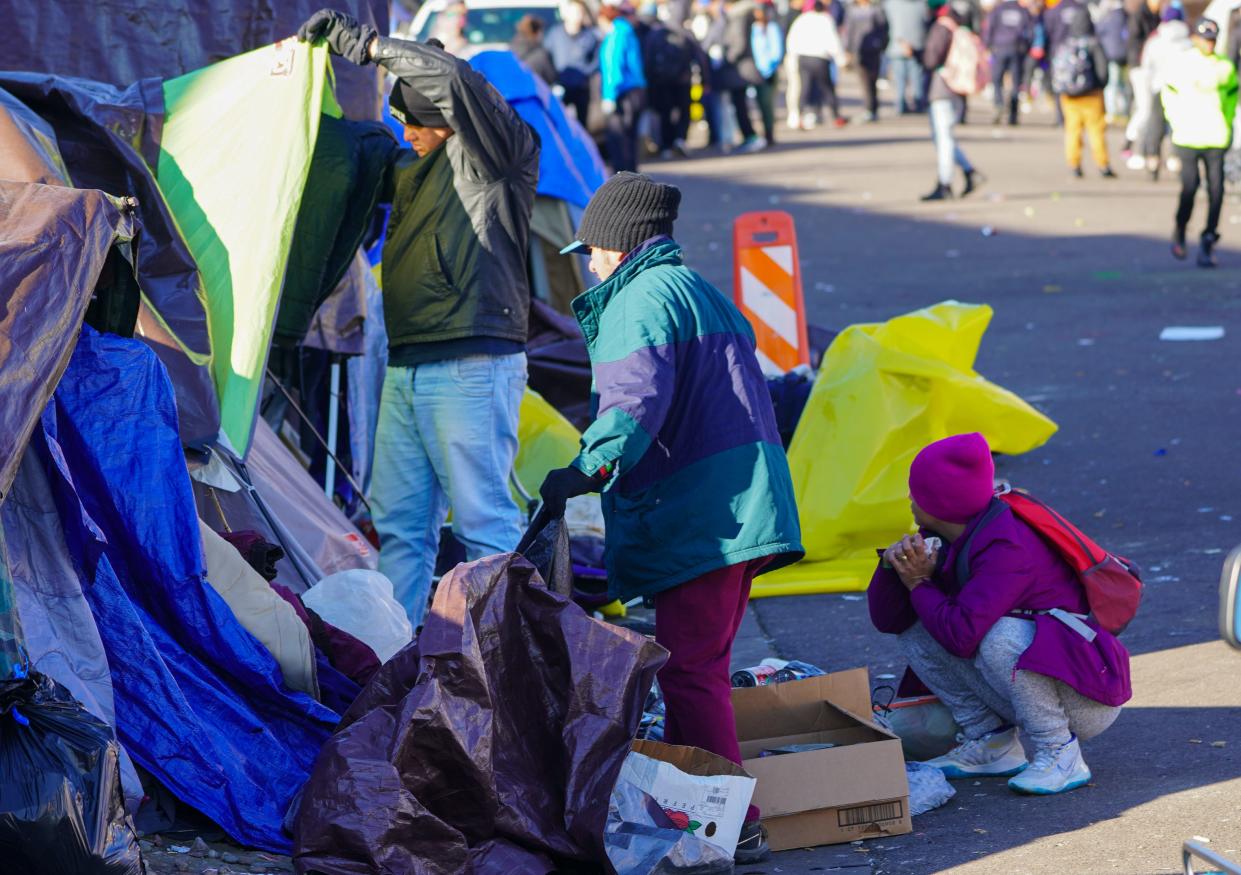Is Fort Collins a 'sanctuary city' or bringing immigrants from Denver? Here's what to know

Fort Collins City Council members have been receiving emails asking them not to accept migrants from Denver as that city grapples with the financial and logistical demands that have come with a surge of new immigrants.
Council has received around two dozen emails from individuals ever since Denver Mayor Mike Johnston said at a Feb. 6 Denver City Council meeting that cities like Fort Collins had expressed that they were open to partnering on help for immigrants.
Johnston's brief mention of Fort Collins, around the 21st minute of the meeting, was in response to a question about whether there was any interest from others in the region to help.
"There's some places that have been very supportive. Want to shout out both Grand Junction and Fort Collins, who have been open to partnership on this and want to see how they can do that," he said.
But Fort Collins says it hasn't received any requests for help and doesn't have a standing program to support such efforts.
City spokesperson Amanda King said a request would typically come through the state of Colorado.
"That request would include clear needs, expected outcomes, timelines and resources to be provided from the state to support the request," she said in an email.
If a request were received, "we would work with other jurisdictions in Larimer County, and nonprofit partners, to assess if there is the ability to support the request and to what capacity," King said. "Again, that assessment typically would not happen without a request from the state of Colorado."
After Johnston's comments, the city of Grand Junction issued a statement saying it had made no commitment nor plans to partner with Denver.
Lori Hodges, Larimer County's director of emergency management, said she doesn't know of any efforts inside the county to aid migrants.
And while individual immigrants can and do show up on their own, the county isn't seeing "busloads" of migrants. County elected officials do get emails stating needs and seeking information about whether jurisdictions are willing or able to help coordinate services, Hodges said. But there have been no formal requests.
What is a 'sanctuary city'? And is Fort Collins one?
Many of the people who sent emails to council said they didn't want Fort Collins to be a "sanctuary city," a term some cities have adopted to declare they have policies to not ask for immigration status, disclose it to authorities or deny services based on it.
In responses to the emails to council, city staff said:
" ‘Sanctuary City’ is not a legal term, and the City of Fort Collins has never taken any action to declare itself a ‘sanctuary city.' "
But Fort Collins has passed two resolutions in recent years with the goal of showing support for immigrants.
A 2019 resolution called for the humane treatment of immigrants at the southern border and urged the federal government to create a sustainable path for legal immigration. It was born out of an effort to help immigrants in the community to feel safe and welcomed.
A 2017 resolution known as the Community Trust Initiative clarified that police and other city employees may not ask residents about their immigration status unless that information is required by state or federal law.
The resolution also called for a city outreach effort to address fears in the immigrant community about interacting with government officials, including when it involved reporting crimes.
The city estimates Fort Collins has an immigrant community of more than 11,000 people, and about 4,500 are not U.S. citizens. About half are eligible for naturalization.
What does Fort Collins' immigration legal defense fund do?
Fort Collins has set up an immigration legal defense fund to assist people who are seeking citizenship or establishing a lawful presence.
The fund was created as a pilot program in 2021.
It pays community organizations, attorneys or law firms to provide immigration legal services for free to people involved in cases related to things like naturalization and citizenship, the Deferred Action for Childhood Arrivals program, seeking asylum, family reunification, deportation/detention and work authorization.
The fund has since been allocated $250,000 per year through 2024.
A status report from late 2022 showed that since the start of the fund, 97 cases had been taken on.
The most common cases were related to special immigrant juvenile status, which is for children who have been abused, neglected or abandoned by parents. There were 22 of those.
Sixteen cases involved U visas, designated for victims of crime.
Twelve cases involved naturalization, and nine were related to obtaining green cards. Eight were asylum cases, seven were related to women experiencing violence, and six were related to deportations/detention.
Fort Collins churches helped host immigrants in 2022
Fort Collins was the site of temporary shelter for about 60 migrants in late 2022.
For 10 days in December of that year, the county, the Red Cross, three churches and nonprofit groups Alianza Norco, Sanctuary Everywhere and Fuerza Latina worked to provide temporary shelter and transportation help.
But that effort revealed that the county didn't have the services to support an endeavor like that in the future, Hodges said.
Furthermore, she said, the county learned that Larimer wasn't a good destination to help people get where they wanted to go. Half of the people needed to go back to Denver to get to their next destination.
Coloradoan reporter Pat Ferrier contributed to this report.
This article originally appeared on Fort Collins Coloradoan: Is Fort Collins a sanctuary city? Is it helping Denver with migrants?

